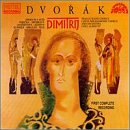| All Artists: Antonin Dvorak, Gerd Albrecht, Czech Philharmonic Orchestra, Drahomira Drobkova, Ivan Kusnjer, Leo Marian Vodicka, Ludek Vele, Lívia Ághová, Magdalena Hajossyova, Pavel Haderer, Peter Mikulas, Zdenek Harvanek Title: Antonín Dvorák: Dimitri Members Wishing: 0 Total Copies: 0 Label: Supraphon Release Date: 1/4/1993 Album Type: Box set, Import Genre: Classical Styles: Opera & Classical Vocal, Chamber Music, Historical Periods, Classical (c.1770-1830) Number of Discs: 3 SwapaCD Credits: 3 UPCs: 789368911325, 099925125929 |
Search - Antonin Dvorak, Gerd Albrecht, Czech Philharmonic Orchestra :: Antonín Dvorák: Dimitri
 | Antonin Dvorak, Gerd Albrecht, Czech Philharmonic Orchestra Antonín Dvorák: Dimitri Genre: Classical |
Larger Image |
CD Details |
CD ReviewsDvorak's Other Grand Opera M. C. Passarella | Lawrenceville, GA | 06/02/2009 (5 out of 5 stars) ""Dimitrij" can be seen as a sort of pendant to the Boris Godunov story covered in Mussorgsky's famous opera. Claiming to be the last surviving son of Ivan the Terrible, Dimitrij advances from Poland toward Russia in a bid to wrest control of Russia from the ailing Boris. When Boris dies suddenly of a stroke, the Russian boyars throw in their lot with Dimitrij, as does the Russian army. Finally, the widow of Ivan, feeling betrayed all around, identifies Dimitrij as her long-lost son though she knows the real Dimitrij has died years before, probably at Boris's behest.
To solidify his claim on the throne, Dimitrij marries the noblewoman Marina Mniszech. But in the most heated section of the opera, he manages to both sidestep a plot against himself and save Xenia, the daughter of Boris and last surviving member of his family, from a fate worse than--well, you know. She becomes Dimitrij's lover. Later, she pleads for the release of the main instigator of the plot, the Boyar Prince Shuisky and turns on Dimitrij, who has, after all, been responsible for wiping out her family. Now, Marina, rightly feeling betrayed, turns the tables on Dimitrij. She has Xenia murdered in revenge. Shuisky, who finds her at the scene of the crime, makes her spill the beans on Dimitrij. Before the exposed Dimitrij can escape, he is shot dead by Shuisky, and before long, the curtain falls. There, dear friends, is a brief synopsis of the action of the opera, fairly streamlined by grand opera standards and compelling, at least on paper. And Dvorak does justice mostly to his libretto, creating an opera of spectacle, pathos, and occasional tenderness. The central section of Act III portraying the love of Xenia and Dmitirij could have benefitted by a few more degrees of Verdi-style heat; it all seems rather too polite even by the standards of the day. And there are a few longueurs, especially in the First Act, though the Second moves at an admirable clip, while the finale is brought off with aplomb, it seems to me. If the music doesn't always impress or sound terribly idiomatic, as do most of Tchaikovsky's even lesser operas from the get-go, there are enough Dvorakian fingerprints to identify the composer, including attractive festive music that has a decidedly Bohemian cast to it. Perhaps the problem is that unlike Tchaikovsky, Dvorak's naturally lyrical idiom didn't lend itself as well to the stage, and it took him years to find his true dramatic voice, in Rusalka. That said, Dimitrij has enough drama and beauty to commend itself to everyone who loves Dvorak and wants to get to know his most successful grand opera outside of Rusalka. The performing version of Dimitrij on this recording is an amalgam made from the first and second version, the lion's share coming from the first version, deemed far more successful by the current editor, Milan Pospisil. I can't, of course, pontificate on such matters, having no access to other versions, but as I've said earlier, the present version does present a fairly streamlined drama with few eddies and whorls to get lost in along the way. The performing forces are mostly admirable, especially Leo Vodicka's Dimitrij. The singer seems to combine the right amount of force and vulnerability to make this complex character believable. Among the others, Livia Aghova's Xenia is especially fresh-voiced and attractive, and while Magdalena Hajossyova seems to struggle in the wedding scene with Dvorak's high tessitura, that can also be said of the sopranos of the admirable Prague Radio Chorus. Dvorak is not easy on his sopranos! Star of the show may be Gerd Albrecht, who specializes in this out-of-the-way repertoire and really has a way of enlivening it and giving it new validity. The remastered recording from the early 90s is fine in every way--clear, wide ranging, and truthful. Again, I recommend this to all Dvorak lovers on the prowl for works that are off the beaten track, especially at Supraphon's giveaway price! I can also recommend it to lovers of grand opera in the style of, say, Lohengrin and its ilk." |
